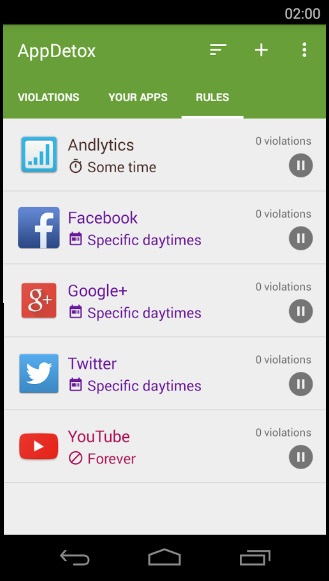Originally by mreinoso on January 23, 2016

According to this article, mobile users can’t leave their phone alone for six minutes and check it up to 150 times a day. Not hard to believe, especially if you use your smartphone as an alarm clock, phone, camera, and to check emails, the weather, what other people are doing, listen to music, watch movies, play games. Do we spend too much time checking our phones? Are we getting addicted to technology? Ironically, there is an app for that.
AppDetox helps by enforcing blockage rules for individual apps. You can restrict the number of launches, block an app during specific times of day or days of the week, or, forever. If you can’t avoid temptation, you won’t be able to access the app and will receive a message like “Facebook? Not now.” This app also keeps time-stamped records of your violations. For real addicts only, or for people who want to beat procrastination. I still find it easier to mute my phone and put it away for a couple of hours if I have to work on a project.

Our dependency or addiction to smartphones is closely related to anxiety disorders. Epidemiologically speaking, anxiety is one of the most prevalent mental disorders, and most people have mobiles. Thus, it is understandable that mobile phones could work as tools for increasing anxiety, promoting a growing addiction feedback cycle.
I recommend this video about “How to cope with anxiety,” from Olivia Remes, in TEDxUHasselt.
https://youtu.be/WWloIAQpMcQ
This is an extreme but I’m setting my phone to airplane mode for the most part this weekend as an experiment. I find that even if I set my phone on silent, my eyes would constantly checking to see if there’s any blue/green flashing light indicating new messages so in that sense, I haven’t freed up my “hard drive”/mental space to concentrate on my work. It is terrifying to notice how I would even come up with excuses to use my phone.
There were days when it was frowned upon to check phones during work but as more functionalities were introduced, it is normal for people to bring their phones everywhere at work. I think the mentality of it is socially acceptable (or expected) to access phone all the time also enables our mobile addiction.
Your Smartphone Reduces Your Brainpower, Even If It’s Just Sitting There (https://www.theatlantic.com/technology/archive/2017/08/a-sitting-phone-gathers-brain-dross/535476/)
Hi Pei,
I find this issue a struggle for everyone, especially students. I was just thinking about this AppDetox, and other similar limiting apps, and perhaps this could be a better approach for schools to help students manage the use of social media during school hours. I think I am going to look into these types of apps to suggest to my students to also teach them strategies to help them focus on school work.
During the discussion on week 2 about what we hate about mobile technologies, one issue that was identified was the need to have our phones with us at all times. There was even the mention of the feeling of a “phantom device” or feeling naked without it. The AppDetox, can help users to manage this issue by setting controls on use of specific apps. This can also help to stop the need to check on social media accounts while working or studying, or just for a period of time, to help with working more efficient, stop procrastination, and the need to be connected all the time. How is the use of an app like this different than, just putting our phones away? Sometimes, we need to use our phones while studying or working, but the distractions of social media, and the need to answer to every message we get can be very distracting. Implementing the use of an app can help to stop the distractions from specific apps.